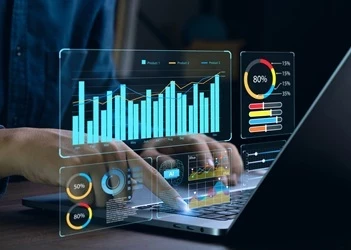Port of Everett taps real-time data analytics to enhance cargo operations
Pilot program is changing how ports manage equipment by improving performance, reducing idle time and setting the stage for digital transformation
Add bookmark
Washington’s Port of Everett is using real-time data analytics to enhance cargo operations in partnership with Jacobs and IGO Solutions.
The new pilot program is changing how ports manage equipment by improving performance, reducing idle time and setting the stage for digital transformation.
The Data Analytics for Port Equipment (DAPE) Pilot Project applied technology designed to monitor equipment emissions, movement and health providing data and data visualization that can be used to optimize asset use, improve safety and reduce turnaround times, without requiring new infrastructure.
The Port of Everett Seaport, located 25 miles north of Seattle, is a natural deep-water, self-operating seaport that supports nearly US$21 billion worth of US exports annually.
Last month, six US cities joined an international alliance to access data analytics support.
Become a member of the AI, Data & Analytics Network for free and gain exclusive access to premium content including news, reports, videos, and webinars from industry experts. Connect with a global community of senior AI and data leaders through networking opportunities and receive invitations to free online events and weekly newsletters. Join today to enhance your knowledge and expand your professional network.
Join NowEmpowering data-driven decisions
In partnership with Jacobs Engineering and IGO Solutions, the port deployed a scalable, cloud-based system that integrates data from portable emissions measurement systems (PEMS) and telematics devices to deliver real-time insights, all presented in an easy-to-use and customizable dashboard, according to a press release.
The deployment empowers data-driven decisions and provides a replicable model for ports of all sizes.
Key technical features of the DAPE platform include:
- Real-time data acquisition: Integrated sensors and telematics systems continuously monitor port equipment operational efficiency and mechanical parameters like fuel consumption and exhaust outputs.
- Operational KPI integration: A cloud-based analytics dashboard tracks efficiency, fuel consumption, idling, maintenance needs and utilization.
- Enhanced operational visibility: Actionable insights support data-driven decisions across port operations and long-term modernization goals.
- Scalability and resiliency: Designed for all port types both in the US and globally, improving operational and sustainability.
- Supplier-agnostic and industry-transferable architecture: Easily integrates with any equipment or system and is transferable to other fleet-heavy industries.
Read: How is AI, data and analytics beneficial to industry?
Real-time data analytics support modern-day port innovation
“At the Port of Everett, we’re always looking for innovative ways to utilize technology to gain efficiencies, plan for the future and enhance sustainability,” said Lisa Lefeber, director/CEO OF the Port of Everett. “This smart technology pilot is an exciting step forward, giving the port industry a new tool for gaining real-time insights into equipment performance and can be used to support short, medium and long-range decision making. This is a great example of a modern-day port innovation.”
Through the collaboration, Jacobs and its partners developed a real time port equipment data analytics platform that integrates with bespoke operational KPIs to monitor and manage cargo handling equipment fleets, added Aldo Ferrufino, VP and director ports and maritime – US West at Jacobs. “This marks a significant step forward in enhancing visibility, efficiency and resiliency in port operations across the industry.”
Image credit: Port of Everett













